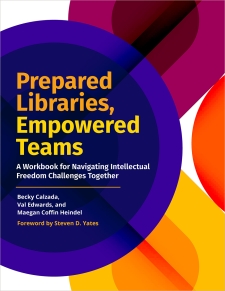Navigating Sudden and Expected Intellectual Freedom Challenges
Becky Calzada, Val Edwards and Maegan Coffin Heindel are the authors of Prepared Libraries, Empowered Teams: A Workbook for Navigating Intellectual Freedom Challenges Together, now available for preorder with shipment beginning Summer 2024. In anticipation of their book’s release, we asked them to update us on the intellectual freedom landscape and provide some guidance to library teams faced with both surprise and anticipated challenges. They share their insights and tips below.
Four key facts about the intellectual freedom challenge landscape since 2020
First, over the last four years the number of mass challenges has exploded and continues to increase. Check out the data from the ALA Office for Intellectual Freedom for the most recent numbers. These challenges have largely targeted diverse books, especially with topics related to LGBTQ+ identities and race/racism.
Second, there has been a significant increase in legislation, both proposed and passed, criminalizing diverse book selection and the librarians selecting them.
Third, there has been a swell of response to these challenges ranging from local to global. Many state-based, grassroots support groups have cropped up, inspired by groups like Texas FReadom Fighters (author Becky Calzada’s organization) and Florida Freedom to Read Project.
 Fourth, local communities are rallying around their school and public libraries. They have engaged in school and library board elections, successfully voting in candidates that are not singularly focused around book banning, and participated in legislative lobbying to prevent criminalization legislation. Additionally, publishing organizations and authors are increasingly filing lawsuits or amicus briefs to protect access to the diverse books they develop.
Fourth, local communities are rallying around their school and public libraries. They have engaged in school and library board elections, successfully voting in candidates that are not singularly focused around book banning, and participated in legislative lobbying to prevent criminalization legislation. Additionally, publishing organizations and authors are increasingly filing lawsuits or amicus briefs to protect access to the diverse books they develop.
Four things to do if your team is suddenly faced with an intellectual freedom challenge
First, hit the pause button! Whether you receive the challenge or question in person, via phone, or through email, allow yourself time to listen closely to the concern, calm your initial emotional response, and prepare to act in a calm and structured fashion.
Second, alert your professional and personal support system, including colleagues inside and outside your organization. From your supervisors to your best friends, you’ll need a variety of thought-partners on deck.
Third, gather selection criteria used for the book (or books) and outline a response based on the governing policies and procedures. Take a stance of affirmation and listening with family or community members who are sharing real concerns.
 Fourth, document any conversations, emails, and meeting notes related to the challenge for future reference. The notes serve to retain important details you may need to reference throughout the process.
Fourth, document any conversations, emails, and meeting notes related to the challenge for future reference. The notes serve to retain important details you may need to reference throughout the process.
Five things to do as a team in preparation for intellectual freedom challenges
First, proactively build team unity by ensuring a deep, system-wide knowledge of your selection policies and reconsideration process for consistent application. Your team cohesion is your greatest asset.
Second, script out deescalating language and role-play tense conversations so every team member is prepared in the moment. Practice, practice, practice!
Third, ensure that your team knows you are available as a resource for ongoing support of the process, pressing questions, and the accompanying emotions. Build networks of support within your team so no one feels they have to face a challenge alone.
Fourth, regularly evaluate your current reconsideration policies and procedures to identify strengths and gaps, and update your action plan to align. Work proactively with your governing organization’s legal counsel, communications teams, and administrators to build a common understanding of your organization’s action plan.
Fifth, build positive relationships with community members and media outlets, building a coalition of supporters locally and nationally. Strong relationships at all levels are foundational to your organizations’ success in fielding a challenge.
Learn more at the ALA Store.
